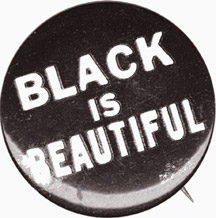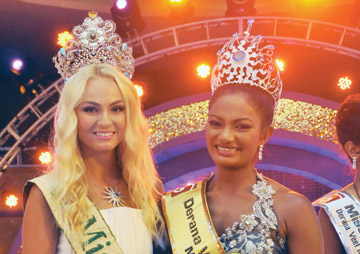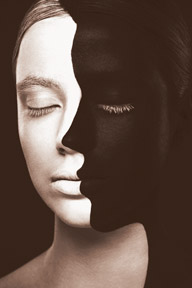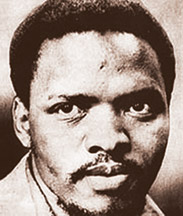The ugly side of beauty: Politics of the dark skin
By Kathya de Silva
What does it take for a woman to look beautiful? A ton of beauty
cream and a load of fairness products? A majority in our society
invariably associate fairness with being pretty and beautiful while
those of the darker skin to be less attractive and less pretty.
According to general understanding, a beautiful girl would ideally be
fair. But to be polite to the 'less
 fortunate'
who have darker skin, they would be referred to as, "good looking
despite being dark" or told "if you were lighter, you'd be prettier."
Many of us have no doubt heard such expressions but ever stopped to
think of the external politics that led to this oppression? fortunate'
who have darker skin, they would be referred to as, "good looking
despite being dark" or told "if you were lighter, you'd be prettier."
Many of us have no doubt heard such expressions but ever stopped to
think of the external politics that led to this oppression?
|

Derana Miss Sri Lanka 2013 Solange Gunawijeya said that she
overcame colour barrier. Miss Earth Tereza Fajksova of Czech
Republic is on her right |
Fairness products are flying out the shelves in large numbers on a
daily basis especially in South Asia despite the health warnings. The
skin whitening industry in India is worth US $40 million while the
global cosmetic industry specifically skin lightening is set to grow to
a whopping US$ 3.6 billion in 2014, according to statistics. There is
nothing wrong in trying to look beautiful or handsome but when men and
women are discriminated by the colour of their skin and young girls and
boys made to think less of themselves, it becomes problematic at many
levels. Encouraging people to bleach their skin to become fairer is in
other words to say that they are not good enough and that they must
change.
Going back in history, there are many examples to show that our
society accepted and celebrated dark skin. When King Walagamba was
fleeing from Soli invaders, a Niganta named Giri mockingly said Maha
Kalu Sinhalaya pala yanawa, (the great black Sinhala man is fleeing),
associating dark skin to a strong personality. King Kawantissa was
considered to be Kakawarna, meaning 'black as the crow' but was
considered to be very handsome. In the old lullaby Vaniyan kalu waniyan,
a mother lovingly calls her baby kalu or 'the dark one' referring to
dark skin with great adoration. Pre-colonial Sinhala names denoting dark
skin such as Kaluethana and Kalubanda are considered to be good Sinhala
names. Even Hinduism has never shown a preference for lighter skin and
there are references to people with dark skins in Hindu scriptures.
Krishna, the incarnation of Vishnu is described as a person of dark
complexion and his name means dark blue or black. However, he was the
epitome of beauty and referred to as 'black as a full raincloud.' In
Buddhism, we come across Arahath Mugalan whose skin is said to be dark
blue or black and he was an Agasau of the Buddha who had great mental
and physical powers.
Today, when society is still struggling to overcome racism which
plagued humanity for centuries, colourism which discriminates a person
in one's own community according to skin tone, has slyly crept into our
lives. This is mostly prevalent among societies with a colonial history.
Roots of this self-loathing can be traced back to the colonial era
when lighter skin was a sign of status-quo. In British India, those with
fair skin enjoyed more opportunities than dark skinned Indians and they
were considered to be more affluent. Anglo-Indians with more European
features were often more upwardly mobile, according to Indian research.
Beyond South Asia, colourism goes back to slavery where
African-Americans with lighter skins were more accepted in society than
the darker ones. Slave owners were known to give special treatment to
slaves of a lighter skin tone, according to historic records. They
enjoyed better jobs than darker skinned slaves with opportunities to
travel abroad and read while their darker-toned peers toiled in the
fields and were even barred from reading.
 |
|

Stephen Biko |
Even within their community, darker skinned African-Americans were
discriminated and they were excluded from social events. Entrance to
special events operated on the 'brown paper bag' principle in the 1960s
where it was customary to hang a brown paper bag on the door and anyone
darker than the bag was denied entrance. Such oppression within the
community and racism at large, led individuals to eliminate
African-American traits by bleaching their skin and trying to be more
like the Caucasians.
It is not uncommon for African-American women today to undergo skin
bleaching. In a popular talk show in the US, a young African-American
woman said that she wished she was lighter so that she will be
considered pretty. She said she tries to make sure that the same fate
does not befall her daughter and started to bleach her daughter's skin
since she was only five years old. According to a CNN study, nearly 60
years after Segregation, the African-American society is heavily skin
biased.
In a more recent incident reported in the St.Petersburg Times, a
dark-skinned waiter of a restaurant in Jonesboro, near Atlanta filed a
lawsuit against his light-skinned African-American manager alleging that
during his work period, the manager repeatedly referred to him as a
'black monkey' and a 'tar baby'. The manager also told him to bleach his
skin, and later was fired after he refused to do so.
In the Indian film industry, fair skinned actresses are preferred
over dark skinned ones when they are cast as coming from upper class,
powerful families. According to some film-makers, they are considered to
be pretty and those of darker skin are considered to be more sexually
promiscuous. During an interview with an Indian TV channel, a film-maker
was asked whether he would cast a dark skinned woman in an advertisement
and his reply was in the negative. The audience was also appalled to
hear him say that dark skinned women are good to be taken to a hotel and
a fair skinned girl to be taken to his mother.
Back home, Miss Earth Sri Lanka 2013 came under heavy criticism for
winning the competition because of her dark skin. Some commented in
websites that she is not attractive enough to represent Sri Lanka
because she is dark. Some people suspect foul play forgetting that a
majority of Sri Lankans are dark. In an interview with us she responded
to her haters saying, "Everyone associates beauty with being fair but
it's more than that. Everyone has their own opinion about beauty
competitions and what beauty is, but I think I made a difference. I
broke the colour barrier!"
In the modeling and film industry in Sri Lanka, preference is high
for fair skinned women. A celebrity make up artist said that most models
and actresses prefer to have their skin lightened with make up for photo
shoots and films as the photographers and directors want their models to
look fairer. When asked from an advertising agent regarding fair skinned
models and actresses, he said that fair skinned women are in demand as
opposed to dark skinned ones.
Fairer skinned babies are praised for their luck in genetics while
mothers apply many kinds of traditional skin whitening lotions on their
darker babies to make them look fairer. Daughters are constantly told by
their elders not to go in the sun and to carry an umbrella to protect
their skin.
Marriage is another area where skin bias is practiced heavily.
Mothers looking for brides for their sons often search for fair skinned
girls. One glance at the marriage proposals section in a newspaper is
evidence that fair skinned brides are the order of the day. Brides too
fall victim and they make sure to mention that their skin is fair in
advertisements. Beauticians as a result, taking advantage of this
ever-growing demand to be fair, draw large sums of money from
brides-to-be assuring them that they will indeed look fair if the skin
is 'treated'.
"I was told by my beautician to use one of their products which will
make me look fair. When I refused to come for weekly facials for three
months as recommended, she said she cannot take the responsibility if I
look ugly on my wedding day," a bride-to-be who wished to remain
anonymous said.
It has been 50 years since South African anti-apartheid activist
Stephen Biko challenged the belief that black people are insignificant
and inherently unattractive. Yet, it seems that many have forgotten this
glorious history. Black is Beautiful is the slogan he used founding the
Black Consciousness Movement in 1962, explained it in his own words as,
"man, you are okay as you are, begin to look upon yourself as a human
being". Biko saw the struggle to restore African consciousness needed a
'psychological liberation' as well as a 'physical liberation'. Black is
Beautiful later became the proud cry of the black people acknowledging
that they are no less human.
The need for a movement such as this has arisen in modern society
especially in South Asia to remind ourselves to stop being ashamed and
learn to accept ourselves. It seems that the society is moving backwards
as people are becoming victims of colourism everyday. The media must
practice more restraint to give a better message to the younger
generation to uplift their self-esteem.
Modern society has many reasons to celebrate as it has challenged
many notions that lead to the marginalization of certain sections of
society. Yet, colourism that has drawn little attention keeps raising
its ugly head to setback the society's forward march. It is one of the
worst dilemmas we face today as it saps our inner strength and tells us
that we are not worthy. It is a continuous journey to heal from the
epidemic of colourism which has been within society for hundreds of
years. It is not easy, but change starts from the root by teaching our
children to accept themselves first and overcome inner barriers before
challenging the outside. Then we can proudly move forward with our heads
held high to face the world. |


